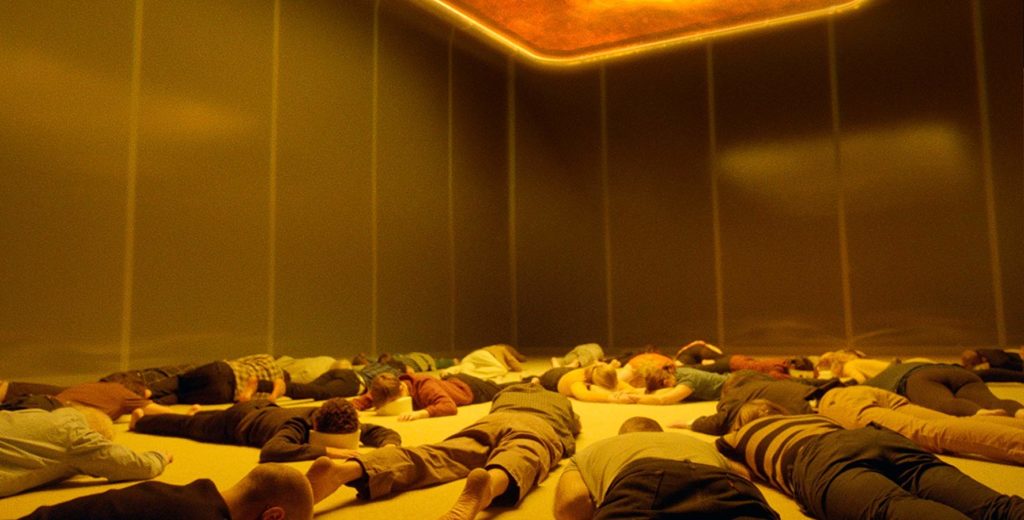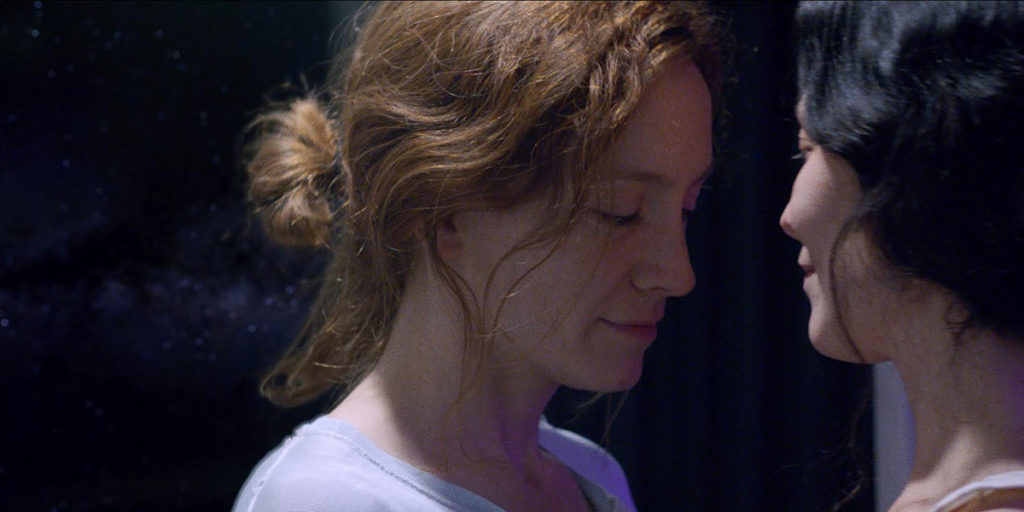A passenger ship is stranded in space after an incident, drifting aimlessly with no hope of rescue or repair. This is the premise of the bleak Swedish sci-fi film Aniara – a movie that’s philosophically and intellectually engaging, but fails to connect emotionally.
Aniara opens on a familiar note – a montage of Earth being ravaged by natural disasters and human negligence. What makes this sequence stand out is how the opening credits crawl across the screen, as if they’re the end credits for the planet.
It’s a striking intro that immediately sets the tone for this bleak sci-fi tale – the first feature film adaptation of the 1956 Swedish poem of the same name by Nobel prize winning author Harry Martinson. Aniara is the name of the ship carrying people from a now uninhabitable Earth to a new human colony on Mars. Its representation in the movie is like a cross between an airport, a shopping centre and a cruise liner.

It’s a good example of the movie smartly using its budget limitations for a thematic purpose. There’s a quiet, arrogant banality to the early scenes in Aniara. The passengers don’t seem too bothered that they’ve left a devastated Earth behind. They just go on about their business. As the ship leaves, a mother tells her child to wave goodbye to the Earth – ‘if you don’t do it now, you’ll regret it later’.
It’s the only time where the movie’s low-key melancholy feels like the perfect note. The extreme underreaction to the crisis on Earth is as shocking as it is (sadly) plausible.
Aniara‘s principal protagonist is the Mimarobe (Emelie Jonsson), a caretaker of sorts for the Mima – a mysterious machine that draws from people’s personal experience to create near-spiritual memories of Earth and its serene natural beauty.
Initially, people don’t seem all that interested in the Mima and what it has to offer. However, when the ship veers off course after nearly colliding with debris, the passengers are told that it might be a very long time before they can turn back. The demand for Mima skyrockets, as people seek to escape their bleak reality in comforting memories of Earth.

It’s a very clear ‘you won’t know what you’re missing until it’s gone’ scenario, but with an extra twist. Mima is eventually overwhelmed, absorbing not only people’s positive experiences, but their negative ones as well. It starts to project nightmarish visions shortly before completely breaking down. A reminder of the destructive power of human carelessness.
As a story, Aniara is first and foremost a warning. Humanity is racing towards its own destruction. We can still do something about it, but that’s not an option we’ll have forever.
Aniara is a vision of world where we take too long to realise that. The ship and the passengers are doomed. This isn’t a story about a last-minute miraculous rescue or ingenious solution. This is a story of slowly encroaching despair that ends with everyone dead and forgotten.
With no more Earth, or even the Mima to remind them of it, people start to unravel. Soon enough, weird sex cults start cropping up, among other things.
The storytelling often skips ahead, first by days and weeks and eventually by years and decades. The time shifts do a good job of showcasing the deterioration of the situation on the ship at large – classic before/after – but they severely undermine the characters and their development.

Aniara just puts too much distance between the audience and the characters, and the time skips often rob them and their relationships of important emotional context.
The romance between Mimarobe and pilot Isagel (Bianca Cruzeiro) is hurt the most by this approach. We go from Mimarobe awkwardly lusting over Isagel to them suddenly in a committed relationship.
One of the movie’s bleakest, most harrowing moments concerns these characters and I just didn’t feel anything for them. I recognised that what I witnessed was sad and tragic, but I didn’t feel sad.
The movie never rises above low level melancholy and while that worked perfectly fine at the start, it undercuts the escalating sense of dread and despair and flattens the story on an emotional level.
I often found myself thinking about Aniara and what it was trying to say, but not engaging with it. The movie ends up being a philosophical exercise, not an emotional journey. That would have been fine if the story itself wasn’t so keen on communicating a sense of irreparable loss.
If the premise of Aniara sounds at all interesting to you, then watch it. You’ll probably walk away disappointed by the movie as a whole, but there’s enough good ideas and striking moments to ponder over. I can’t say if directors Pella Kågerman and Hugo Lilja do the poem justice, but they did make me want to look it up and try to read it for myself.
ANIARA is released in cinemas and on digital HD from 30th August.
